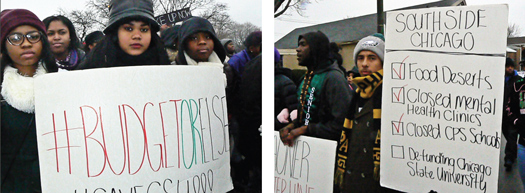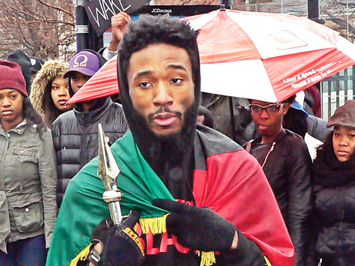Budget Impasse Could Shutter Only Majority Black University In Illinois
By LaRisa Lynch -Contributing Writer- | Last updated: Jan 12, 2016 - 6:04:11 PMWhat's your opinion on this article?

(L) Campus leaders want the governor of Illinois to act before a budget impasse and lack of funds closes Chicago St. University. (R) Students marched through the cold to demand support for the only predominantly Black university in Illinois.
|
CHICAGO—As Chicago State University students return from holiday break back to their south side campus, they face an uncertain future.
A budget impasse between the General Assembly and Illinois’ Republican governor, Bruce Rauner, could force the state’s only university that serves predominately Black students to either shutter its doors or cut staff and academic programming by mid-semester.
That’s when CSU reserve funds will run out. The university has been operating off reserves that now have dwindled down to $9 million—enough to operate the 7,000 student body university for two more months. It costs about $5 million a month to operate the university that began in 1867 as teacher training school. For fiscal year 2016, the governor proposed $27.1 million for CSU’s budget, a 30 percent drop from last year fiscal budget of $39.1 million, according to public TV station WTTW’s Chicago Tonight program.

Charles Preston participates in protest demanding state fully fund Chicago St. University.
|
As a result a mix of Greek-letter organizations, students and faculty took to the streets during a cold rainy Saturday afternoon to demand Gov. Rauner to stop playing political football with student lives and pass a budget that adequately funds education to keep CSU operating at levels before the state’s budget crisis.
“We are out here fighting to push the governor to provide a budget for the state of Illinois,” said Paris Griffin, CSU Student Government Association president, which sponsored the protest march. “Without a budget higher education is in trouble of being defunded and without those funds it’s making achieving our education even harder.”
More than 100 protesters marched through the streets chanting “Black education is good for our health, save CSU budget or else!” “CSU saves lives” and “Black students matter; Black professors matter” as part of “Operation Save CSU.” The student-led march blocked traffic doing performance pieces including poetry, singing civil rights protest songs and speaking about the impact of the state’s budget crisis on students.
Ms. Griffin, a member of Alpha Kappa Alpha sorority, noted that all public institutions are facing funding shortages, but CSU is hit harder because of its student population. Most students attending CSU are parents, many of whom work while others are working on their master’s degrees, she said.
“It is affecting us the most because we have the most non-traditional Black students,” Ms. Griffin said. “The government knows who relies on what and how much they rely on. So by not funding us, I believe that they know it is going to be detrimental for us.”
“If no state action is taken before March 1 to give CSU the state funds it needs to operate, than we expect a massive disruption of operations to take place,” said Tom Wogan, CSU’s public relations director. “It’s hard to say exactly what that will entail as we are in uncharted waters. There has never been a 7 month delay in state funding before.”
Calls to the governor’s office seeking comment were not returned by Final Call deadline.
The state has been without a budget for the six months as Gov. Rauner attempts to force the legislature to pass his pro-business agenda. That agenda includes reforming workers’ compensation and creation of “right-to-work” zones where workers can opt not to join a union or pay fair share fees.
But caught in the middle are cuts in social service programs such as childcare and eldercare. Even the state’s Monetary Assistance Program (MAP) grants, which help students pay for college, have been sliced.
CSU student Charles Preston, a senior majoring in African-American Studies, is feeling the pinch from the loss of his MAP grant. He said he will not have money for books this semester and is also concerned his mother, who is employed at the school, will lose her job.
“I have to make hard decisions,” Mr. Preston said. “Do I drop out of school to get employment so I can keep up with bills … or do I go to school as a full time student, try to hurry up and graduate as a senior while maintaining my federal work study which is little to nothing? So those are hard decision seniors have to make at Chicago State.”
The march’s goal, he added, is to make sure Gov. Rauner signs the budget but also does not decrease funding allotted to universities.
For many students attending CSU, the university is more than just a place of higher learning. Some called the school a place where students find their voice and self-worth—something that cannot be obtained at a traditional White university. Additionally, CSU is an affordable option for inner city youth to attend college.
“It teaches a lot of African-American youth about who they are, gives us a cultural grounding and a new frame to look at life through. It transforms Black minds,” said Dave Flynn, a junior majoring in sociology and a member of Alpha Phi Alpha fraternity. “The school is like an oasis in the desert. It saves lives. It transforms lives.”
CSU is an untapped resource in Chicago, added Arthur Amaker, a CSU English professor who marched with the students. His message to the state legislature is pass the budget or be responsible for destroying “the lives of thousands of qualified and talented students.”
“I don’t like the idea that politics and education is being combined. Those are two separate arenas,” Prof. Amaker said. “We have a situation now where corporations as well as politicians are determining our futures as educators and students. That’s not fair.”
Some students urged the myriad of Black community and religious leaders who supported Mr. Rauner during his 2014 election campaign to use their influence to encourage Gov. Rauner to pass a budget. Gov. Rauner picked up a bevy of support from prominent Black leaders including Rev. Corey Brooks of New Beginnings Church; Rev. Marshall Hatch of New Mt. Pilgrim Baptist Church and former state Senator Rev. James Meeks—all of whom garnered positions or appointments in Mr. Rauner’s administration. The Final Call reached out to Rev. Hatch, who was appointed to Chicago State University’s board of trustees, for comment to no avail.
Darren Martin, a CSU senior, called the school a “home away from home” since he has been participating in summer enrichment programs there since 1993. As an eighth grader, he took karate at the school. But Mr. Martin noted religious leaders who support Mr. Rauner shouldn’t be silent about the budget crisis because it probably has “hurt some members of their own congregation.”
“Members of their communities and of their congregations are missing out on services because of this,” he said. “They should get off their derrieres and force Rauner to do something because they supported him and got him into office.”
Mr. Preston, however, said the fight to save CSU lies in students’ hands, not in leaders who helped Mr. Rauner get elected. He said no one is going to fight for students but students because they “have the power to change their situations and circumstance.”
“I am not here to aggressively attack leaders,” he said. “I am not here to aggressively call people out. I am here to organize my community, organize these students so they can be the change they want to see. This march is just the first step.”
INSIDE STORIES AND REVIEWS
-
-
About Harriett ... and the Negro Hollywood Road Show
By Rabiah Muhammad, Guest Columnist » Full Story -
Skepticism greets Jay-Z, NFL talk of inspiring change
By Bryan 18X Crawford and Richard B. Muhammad The Final Call Newspaper @TheFinalCall » Full Story -
The painful problem of Black girls and suicide
By Charlene Muhammad -National Correspondent- » Full Story -
Exploitation of Innocence - Report: Perceptions, policies hurting Black girls
By Charlene Muhammad -National Correspondent- » Full Story -
Big Ballin: Big ideas fuel a father’s Big Baller Brand and brash business sense
By Bryan Crawford -Contributing Writer- » Full Story






 Click Here Stay Connected!
Click Here Stay Connected!








